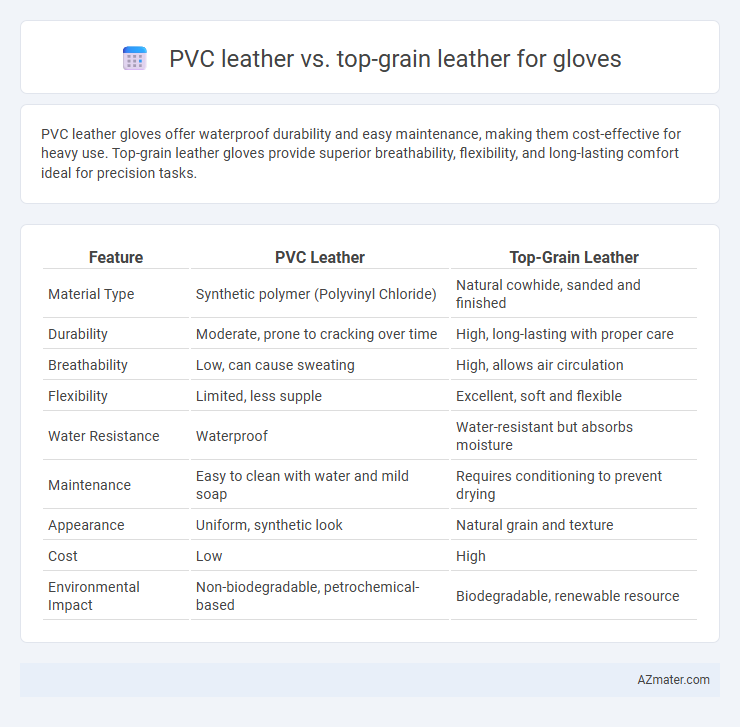PVC leather gloves offer waterproof durability and easy maintenance, making them cost-effective for heavy use. Top-grain leather gloves provide superior breathability, flexibility, and long-lasting comfort ideal for precision tasks.
Table of Comparison
| Feature | PVC Leather | Top-Grain Leather |
|---|---|---|
| Material Type | Synthetic polymer (Polyvinyl Chloride) | Natural cowhide, sanded and finished |
| Durability | Moderate, prone to cracking over time | High, long-lasting with proper care |
| Breathability | Low, can cause sweating | High, allows air circulation |
| Flexibility | Limited, less supple | Excellent, soft and flexible |
| Water Resistance | Waterproof | Water-resistant but absorbs moisture |
| Maintenance | Easy to clean with water and mild soap | Requires conditioning to prevent drying |
| Appearance | Uniform, synthetic look | Natural grain and texture |
| Cost | Low | High |
| Environmental Impact | Non-biodegradable, petrochemical-based | Biodegradable, renewable resource |
Introduction to PVC Leather and Top-Grain Leather
PVC leather is a synthetic material made from polyvinyl chloride, designed to mimic the look and feel of genuine leather while offering enhanced durability and water resistance. Top-grain leather, sourced from the upper layer of animal hide, is prized for its superior strength, natural texture, and breathability, making it a premium choice for gloves. The key difference lies in PVC leather's affordability and maintenance ease versus top-grain leather's comfort and long-lasting wear.
What is PVC Leather?
PVC leather, also known as polyvinyl chloride leather, is a synthetic material made by coating polyester fabric with a plastic polymer to mimic the appearance and texture of genuine leather. This type of leather offers excellent water resistance, durability, and affordability, making it a popular choice for gloves used in environments requiring moisture protection. Unlike top-grain leather, which is derived from the outermost layer of animal hide with natural grain patterns, PVC leather provides a consistent surface and is easier to clean but generally lacks the breathability and natural aging qualities of genuine leather.
What is Top-Grain Leather?
Top-grain leather, commonly used in high-quality gloves, is the second-highest grade of leather derived from the top layer of the hide after the outermost layer is sanded away to remove imperfections. It offers superior durability, breathability, and a natural look compared to PVC leather, which is synthetic and less breathable. Top-grain leather gloves provide enhanced comfort and longevity, making them ideal for heavy-duty use and professional applications.
Durability Comparison: PVC vs Top-Grain Leather
Top-grain leather gloves exhibit superior durability due to their natural fiber structure and resistance to wear, making them ideal for heavy-duty use. PVC leather gloves, while more affordable and water-resistant, tend to degrade faster with repeated flexing and abrasion. For sustained performance and long-term durability, top-grain leather remains the preferred choice in glove manufacturing.
Comfort and Wearability Differences
PVC leather gloves offer water resistance and affordability but typically lack breathability, leading to increased hand sweat and reduced comfort during prolonged use. Top-grain leather gloves provide superior softness, flexibility, and natural breathability, enhancing comfort and reducing hand fatigue over extended wear. The durability and moisture-wicking properties of top-grain leather contribute to better wearability compared to the synthetic, less adaptive nature of PVC leather.
Breathability and Moisture Management
Top-grain leather offers superior breathability and moisture management compared to PVC leather due to its natural porous structure, allowing air circulation and sweat evaporation. PVC leather, being synthetic and non-porous, traps heat and moisture, leading to discomfort and reduced glove performance during prolonged use. Choosing top-grain leather gloves ensures better ventilation and long-lasting dryness, critical for hand comfort and skin health in various activities.
Aesthetic Appeal: Looks and Feel
Top-grain leather gloves offer a rich, natural texture with subtle grain patterns and a supple feel that enhances elegance and luxury. PVC leather gloves mimic the smooth, shiny surface of genuine leather but often lack the depth and warmth in appearance, resulting in a more synthetic look. The tactile experience of top-grain leather is softer and more breathable, making it preferred for premium glove aesthetics and comfort.
Sustainability and Environmental Impact
PVC leather often involves non-biodegradable synthetic polymers derived from fossil fuels, generating significant environmental concerns due to toxic chemical release and end-of-life landfill accumulation. Top-grain leather, sourced from animal hides, is biodegradable and can be sustainably managed through responsible livestock farming and vegetable tanning processes that reduce chemical pollutants. Choosing top-grain leather gloves supports circular economy principles by promoting durability and recyclability, whereas PVC leather contributes to microplastic pollution and challenging recycling protocols.
Cost Analysis: Which is More Budget-Friendly?
PVC leather gloves typically cost significantly less than top-grain leather gloves due to cheaper raw materials and simpler manufacturing processes. Top-grain leather offers superior durability and breathability, which justifies its higher price but may not be ideal for budget-conscious buyers. For cost-effective purchases, PVC leather gloves provide an affordable alternative without compromising basic functionality.
Which Leather is Better for Gloves?
Top-grain leather offers superior durability, breathability, and flexibility, making it the preferred choice for high-quality gloves that require prolonged use and comfort. PVC leather, while more affordable and water-resistant, lacks the natural softness and longevity of top-grain leather, leading to reduced performance over time. For gloves demanding both resilience and tactile precision, top-grain leather remains the better material.

Infographic: PVC leather vs Top-grain leather for Glove
 azmater.com
azmater.com